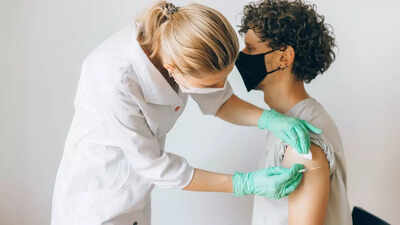Measles virus can stay in the air for up to 2 hours: Here’s how to stay safe

The measles virus doesn’t need direct contact to infect you—it can hang in the air for up to two hours after an infected person has coughed or sneezed. As summer travel ramps up, this highly contagious respiratory disease is riding the wings of global movement, making stops in airports, concerts, and tourist hotspots.According to a new advisory issued by the Centers for Disease Control and Prevention (CDC), “Travelers can catch measles in many travel settings, including travel hubs like airports and train stations, on public transportation like airplanes and trains, at tourist attractions, and at large, crowded events.”As of May 30, the U.S. has recorded 1,088 confirmed cases of measles across 32 states—its worst outbreak since 2020. The CDC also reported that 62 of those cases involved individuals traveling by air.
How measles spreads—and why it’s so dangerous
Measles spreads through respiratory droplets when an infected person coughs or sneezes. But unlike many other viruses, it remains viable in the air and on surfaces for hours after exposure.

Measles, a highly contagious viral disease, spreads through the air when an infected person breathes, coughs, or sneezes, releasing tiny droplets containing the virus. These droplets can infect others who breathe them in or by touching surfaces contaminated with the droplets and then touching their mouth, nose, or eyes. The CDC notes that people are contagious up to four days before and after the rash associated with measles appears. Early symptoms mimic the common cold: high fever, cough, runny nose, and red, watery eyes.
The best protection: Get vaccinated
The CDC recommends the MMR vaccine—measles, mumps, and rubella—for everyone, especially those planning to travel internationally. Infants between 6 to 11 months should get one dose at least two weeks before departure. Children should then receive two more doses: one between 12 and 15 months, and the second between ages 4 and 6.“Children 12 months old and older, teenagers, and adults who are unsure of their immunity against measles should receive two doses of MMR vaccine at least 28 days apart before international travel,” the CDC emphasized in its advisory.Adults who were vaccinated between 1963 and 1967 may have received a less effective version of the vaccine. “If you fall into that age range and you are not sure what version of the vaccine you got,” said Adam Ratner, director of pediatric infectious diseases at NYU Grossman School of Medicine, “the CDC recommends another dose.”For those born before 1957, the assumption is that natural infection during childhood has conferred immunity.
Air Travel: What’s the real risk?
Despite the airborne nature of measles, the actual risk on airplanes is lower than you might think. Experts explain that the act of traveling is not inherently risky, as airplanes have filters; however, this filter system is often turned off during boarding and deplaning. Most cases tied to travel don’t occur mid-flight, but rather at destinations with active outbreaks.

What about terminals and public spaces?Measles transmission isn’t limited to the air or your airplane seat. According to a 2014 CDC report, four unvaccinated people contracted measles after brief exposures inside a U.S. airport terminal—not even in the international section. While the advisory should be taken with utmost seriousness, there is no need for panic.
Exposed and unvaccinated? Here’s what you can do
If you’re unvaccinated and believe you’ve been exposed to measles, timing is critical.The CDC advises getting the MMR vaccine within 72 hours of exposure to reduce symptom severity or prevent illness entirely. If vaccination isn’t an option, a dose of immunoglobulin within six days may help.For travelers who can’t receive the vaccine due to pregnancy, immune compromise, or recent vaccinations, the CDC suggests speaking with a clinician—and possibly postponing your trip.Measles cases have been confirmed this year in 32 states, including California, Florida, Texas, and New York. Globally, outbreaks in Mexico and Canada have contributed to the CDC’s push for pre-travel vaccination to any international destination.




